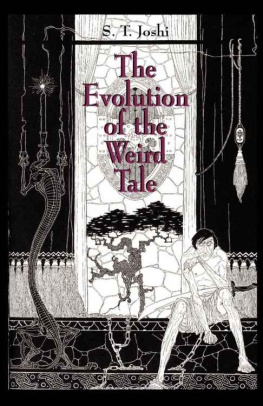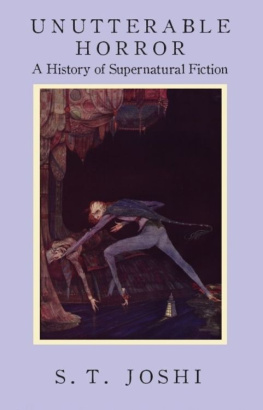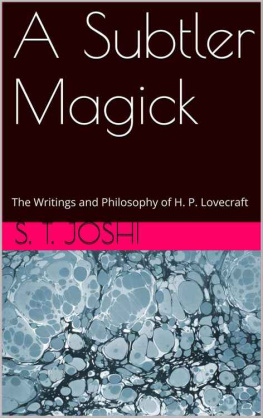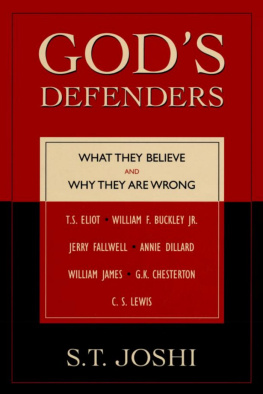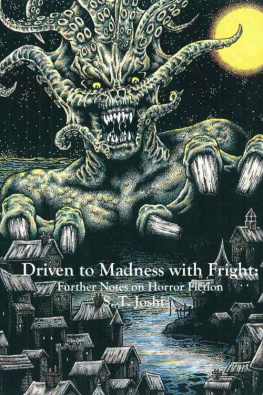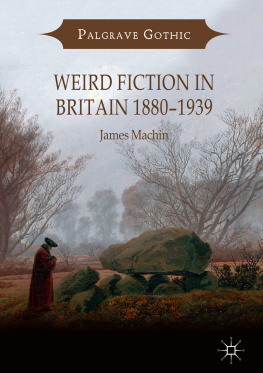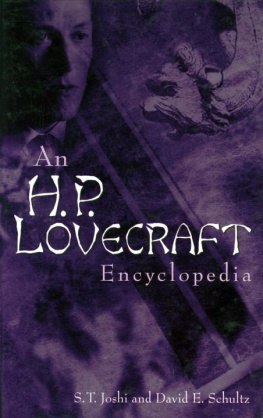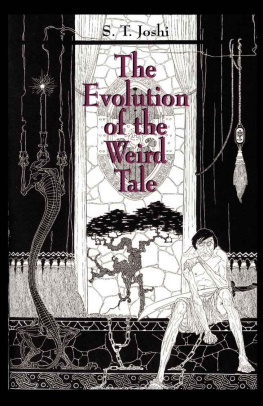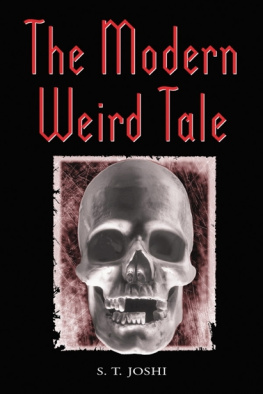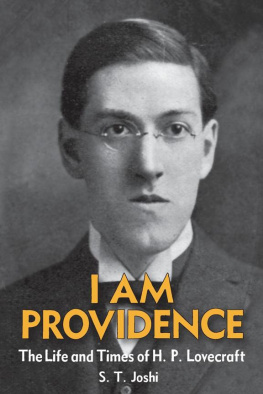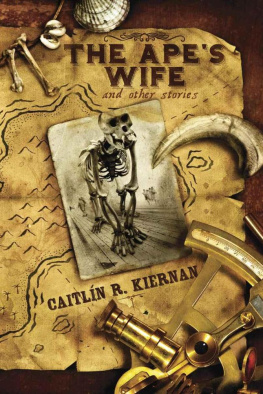The Evolution of the Weird Tale
TheEvolution
ofthe WeirdTale
S. T. Joshi
Hippocampus Press
New York
Copyright 2004, 2016 by S. T. Joshi
Publishedby Hippocampus Press
P.O. Box 641, New York, NY 10156.
http://www.hippocampuspress.com
Allrights reserved.
No part of this work may be reproduced in anyform or by any means
without the written permission of thepublisher.
Cover art by WallaceSmith from Fantazius Mallare byBen Hecht (Covici-McGee, 1922).
Cover design by Barbara Briggs Silbert.
Hippocampus Press logo designed by Anastasia Damianakos.
First Electronic Edition, 2016
ISBN: 978-1-61498-160-2
Contents
Introduction
Robert Bloch long agoremarked that Lovecraft was my university. By this hemeant that association with Lovecraft opened up to him many realms ofenquiry that he might not otherwise have explored, so that, beyondthe valuable assistance Lovecraft lent him in the actual writing ofhis weird fiction, his intellectual horizons were also vastlyexpanded. That same result can be had by anyone who approachesLovecrafts work critically and analytically; in particular,his study Supernatural Horror in Literature (1927) providestantalisingly brief discussions of authors of weird fiction the fullrange of whose work begs for exploration. In many ways, the essays inthis volume are attempts to probe some of the writers Lovecraft foundstimulating but whom he felt unable to study at length in hisavowedly compressed monograph.
Itshould, however, not be assumed that, aside from the essays inSection II, my focus is in any sense upon the manner in whichthe writers in question influenced Lovecraft. That is something thatcan and should be the subject of separate enquiry. Instead, I havesought to examine the entirety of the weird output of these authorsin an attempt to grasp their overall literary aims and purposes. Mycritical method is explicitly judgmental, as I consider it anessential component of the critics function to pass aninformed judgment upon the merits or demerits of a given work ofliterature, or of the authors work as a whole. Critics occupya central function in the establishment of a literary canon, and theyare important in counteracting the spurious impressiveness of merepopular appeal. But the key is not the mere expression of a judgmentupon a given author or work, but a judgment informed by an exhaustiveknowledge of the field andthat most intangible and indefinableof qualitiesa keen critical sense that distinguishes thesuperficial from the profound, the meretricious from the sincere, andthe obvious from the complex. It was, after all, Lovecraft who firstidentified the modern masters of weird fiction inArthur Machen, Algernon Blackwood, Lord Dunsany, and M. R. James; andit was in conscious homage of this critical judgment that I chose, inThe Weird Tale (1990), to discuss these four authorsalongwith Ambrose Bierce and Lovecraft himselfin greater detailthan Lovecraft allowed himself to do.
Iam unwavering in my acknowledgement of Philip Van Doren Sternsdesignation of the period roughly spanning the years 18801940as the Golden Age of weird fiction. The leading figuresof this period are too well-known to cite, but I have foundsubstantial merit in several lesser authors who added theircumulative merits to this rich period, whether it be such Americansas W. C. Morrow or Robert W. Chambers or such Englishmen as E. F.Benson and Rudyard Kipling. In my researches I have been fortunateenough to have had the resources to unearth uncollected weirdwritings by these and other authors, so that the whole of their weirdwork could be assessed. Even such a highly regarded mainstream writeras L. P. Hartley has rarely been treated as a contributor to theliterature of the weird; and further work could be done in relatinghis ghostly tales to his non-weird novels and stories.
Lovecraftis, in many senses, the linchpin of the twentieth-century weird tale,not only for his absorption of the best weird work of the past butfor his nurturing of a fair proportion of the best work that followedhim. Of the three disciples whose work I discuss hereFritzLeiber, Robert Bloch, and Frank Belknap LongLeiber is clearlypreeminent, and is perhaps the only writer of the LovecraftCircle who can bear comparison with Lovecraft himself inliterary stature. Further studyelaborating upon BruceByfields pioneering treatise, Witches of the Mind: ACritical Study of Fritz Leiber (Necronomicon Press, 1991)oughtto be done in explicating the whole of Leibers substantialwork.
Incontemplating post-Lovecraftian weird fiction, it is difficult toresist concluding that we have entered a definite Silver Agethat reveals a marked falling-off of quality and richness from theGolden Age. This need imply no disrespect to suchwriters as Shirley Jackson or Ramsey Campbellthe two authors Itreated exhaustively in The Modern Weird Tale (2001).Campbell, indeed, has now produced so extensive and meritorious abody of work as to challenge both Lovecraft and Blackwood forabsolute preeminence in the field. But aside from such lamentablyunprolific writers as T. E. D. Klein and Thomas Ligotti, the modernage seems to boast few figures who can rival the modernmasters, or even some of the more interesting lesser writersof the earlier period. My own fondness for Rod Serling, Les Daniels,and the exceedingly little-known L. P. Davies is perhaps largely apersonal prejudice; but no one can deny that Dennis Etchison andDavid J. Schow belong somewhere within the canon of modern weirdfiction. Of the merits of the popular Poppy Z. Brite I am a bit moresceptical.
Noneof the essays in this volume should be regarded as exhaustive ordefinitive; there is always more to say about any author ofsubstance, and differing judgments as to the merits or flaws of agiven writer can frequently stimulate thought and discussion. It istrue that in most cases I am writing here as an advocateassomeone who is convinced of the worth of the writers he is treatingand who hopes to convey that worth to others. But I trust that thisapproach does not blind me to these authors faults, or commitme to the assumption that they occupy the very loftiest strata in thecanon of weird fiction. It will be sufficient if what I say aboutthem incites readers to seek out their workdifficult though itmay be to locate, in some instancesand come to their ownevaluative judgments as to their substance and interest.
S. T. Joshi
Acknowledgements
Some of the essayscontained in this book began as introductions to collections of weirdtales by the authors discussed. This includes the essays on W. C.Morrow (from Morrows The Monster Maker and Other Stories[Midnight House, 2000]), Robert W. Chambers (from Chambers TheYellow Sign and Other Stories [Chaosium, 2000]), Edward LucasWhite (from Whites The Stuff of Dreams [HippocampusPress, forthcoming]), Sir Arthur Quiller-Couch (from Quiller-CouchsThe Horror on the Stair and Other Stories [Ash-Tree Press,2000]), and Rudyard Kipling (from Kiplings The Mark of theBeast and Other Stories [Dover, 2000]).
Severalessays first appeared in Studies in Weird Fiction, includingthose on F. Marion Crawford (Winter 1998), Frank Belknap Long(Summer 2001), Robert Bloch (Winter 1995), Fritz Leiber (Winter1999), Rod Serling (Spring 1990), Les Daniels (Fall 1990), DennisEtchison (Summer 1994), and David J. Schow (Summer 1993). The essayon L. P. Hartley appeared in Niekas (1998). H. P. Lovecraft:The Fiction of Materialism appeared in AmericanSupernatural Fiction, ed. Douglas Robillard (Garland, 1996). Theessay on E. F. Benson was initially a review in Necrofile(Winter 1994), and the essay on Poppy Z. Brite was a review in Worldsof Fantasy & Horror (Winter 199697). The essay on L.P. Davies appeared in
Next page
